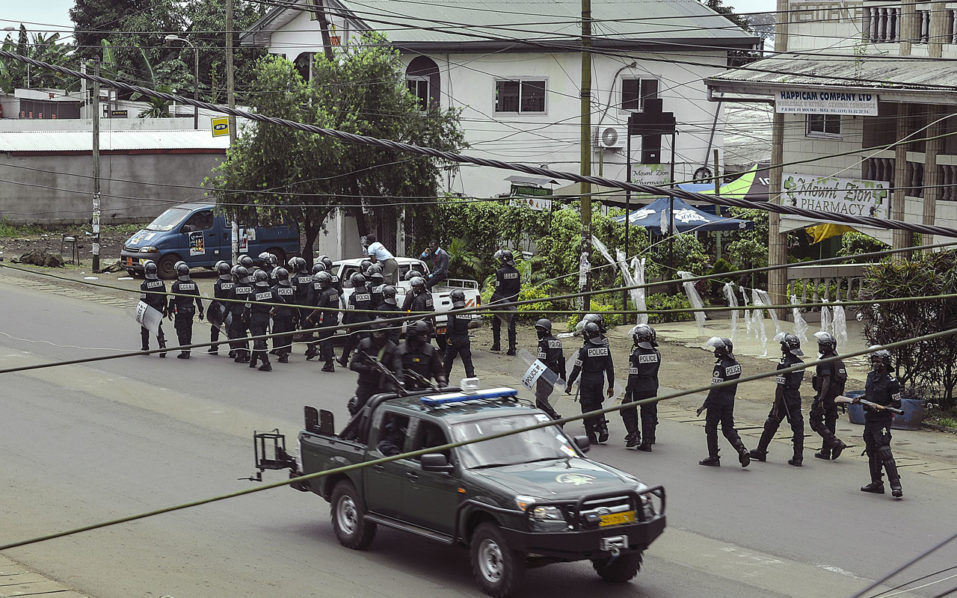 |
| (FILES) Cameroon police officials with riot equipment patrol along a street in the administrative quarter of Buea some 60kms west of Douala on October 1, 2017. A young man from Cameroon’s English-speaking region was shot dead by security forces in the city of Kumba on the eve of an expected symbolic declaration of independence by anglophone separatists, medical and security forces told AFP. / AFP PHOTO / STRINGER |
Four Cameroonian soldiers were killed by suspected separatists in a restive English-speaking region early Wednesday, army and government sources said.
“Four soldiers were killed around 2am around Mamfe,” a city in the country’s Southwest Region, according to an army source.
“They murdered our soldiers. If that’s not terrorism, what is it?” the source said angrily.
The deaths were confirmed by a government source, although the circumstances were not given.
The bloodshed is the latest episode in an escalating crisis in the Southwest and Northwest regions, home to a large minority of English-speakers in the francophone-majority nation.
Eight members of the security forces have been killed this month alone.
Resentment among anglophones over perceived discrimination has fed a spiral of political demands and a crackdown, leading to calls for secession.
On October 1, a breakaway movement issued a symbolic declaration of independence for their putative state of “Ambazonia,” led by Sisiku Ayuk.
President Paul Biya fiercely opposes secession or a return to Cameroon’s former federal structure.
The campaign against the separatists has led to night-time curfews, restrictions on movement, raids and body searches, as well as an attempt by the central government in Yaounde to reach out to the anglophone community for political dialogue.
At least 14 civilians have died, as well as five prisoners who were killed while trying to escape jail, according to a toll compiled by AFP.
International monitors, in contrast, say at least 20 and possibly 40 people have been killed since late September.
English-speakers comprise about a fifth of the country’s 22 million people, and often say they suffer from economic inequality and discrimination, especially in education and the legal system.
The anglophone presence in Cameroon is rooted in the colonial past of West Africa.
France and Britain divided up the former German colony under League of Nations mandates after World War I.
A year after the French-ruled territory became independent in 1961, the southern part of British Cameroons was integrated into a federal system.
That structure was scrapped 11 years later in favour of a “united republic”.
AFP
“Four soldiers were killed around 2am around Mamfe,” a city in the country’s Southwest Region, according to an army source.
“They murdered our soldiers. If that’s not terrorism, what is it?” the source said angrily.
The deaths were confirmed by a government source, although the circumstances were not given.
The bloodshed is the latest episode in an escalating crisis in the Southwest and Northwest regions, home to a large minority of English-speakers in the francophone-majority nation.
Eight members of the security forces have been killed this month alone.
Resentment among anglophones over perceived discrimination has fed a spiral of political demands and a crackdown, leading to calls for secession.
On October 1, a breakaway movement issued a symbolic declaration of independence for their putative state of “Ambazonia,” led by Sisiku Ayuk.
President Paul Biya fiercely opposes secession or a return to Cameroon’s former federal structure.
The campaign against the separatists has led to night-time curfews, restrictions on movement, raids and body searches, as well as an attempt by the central government in Yaounde to reach out to the anglophone community for political dialogue.
At least 14 civilians have died, as well as five prisoners who were killed while trying to escape jail, according to a toll compiled by AFP.
International monitors, in contrast, say at least 20 and possibly 40 people have been killed since late September.
English-speakers comprise about a fifth of the country’s 22 million people, and often say they suffer from economic inequality and discrimination, especially in education and the legal system.
The anglophone presence in Cameroon is rooted in the colonial past of West Africa.
France and Britain divided up the former German colony under League of Nations mandates after World War I.
A year after the French-ruled territory became independent in 1961, the southern part of British Cameroons was integrated into a federal system.
That structure was scrapped 11 years later in favour of a “united republic”.
AFP
In this article:
